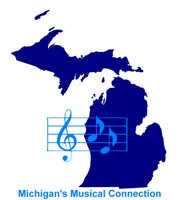Michigan's Musical Connection: Marv Weyer
 Though it has been sporadic lately, due largely to holiday travel, here is this week's edition of Michigan's Musical Connection. Today's artist spotlight takes into the genre of Rockabilly music. As a form of musical expression, Rockabilly is a hybrid between traditional country music, early rock and roll, swing music, and "doo-wop" musical flavors.
Though it has been sporadic lately, due largely to holiday travel, here is this week's edition of Michigan's Musical Connection. Today's artist spotlight takes into the genre of Rockabilly music. As a form of musical expression, Rockabilly is a hybrid between traditional country music, early rock and roll, swing music, and "doo-wop" musical flavors.It's origins can be traced to the late 1940's to early 1950's. Here's a link to the Rockabilly Hall of Fame web page that includes a list of many artists that played a definitive and significant role for the genre.
There are several names that figure prominently in Rockabilly history that hail from Michigan. Our artist profile today is guitarist Marv Weyer. As there is limited online biographically information, I will offer a brief summary of his background from information I read at the Rockabilly Hall of Fame web site.
Marv Weyer was born in Pontiac, Michigan and grew up in a musical family where his father was a local bandleader. His earliest musical inspiration was classical guitar icon, Django Reinhardt. In high school, Marv played with The Jaguars who eventually went on to record on Motown's Tamla record label. Marv Weyer made several television appearances on local dance shows.
As his star began to rise, Marv decided to join the Marines where he served a tour in Vietnam and later based in California. He resumed his musical career and soon became something of a journeyman eventually heading to Nashville where he played with the likes of Bud Issacs, Merle Haggard, Ray Price, and Barbara Mandrell. In the early 1970's, Marv Weyer returned to Michigan and played in several jazz and country groups in the area. He partnered with fellow Michigander Eddie Jackson, another key figure in Rockabilly music. This association lasted until Eddie passed in 2002.
Rockabilly has been experiencing a revival, for lack of a better term, that saw this genre surfacing in the mid-1990's. A new and younger audience were "groovin'" to the music of Brian Setzer of Stray Cats fame and this allowed the legends of Rockabilly their long deserved due.
Labels: Michigan's Musical Connection







0 Comments:
Post a Comment
Subscribe to Post Comments [Atom]
<< Home